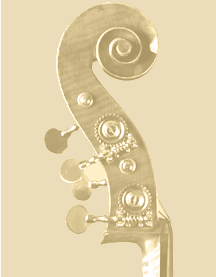How to practice on an upright bass?
Practicing on your upright bass, should never really be a chore,
but truly, a labor of love. Of the many great questions to ask the
really great upright bass players, one that seldom gets asked is,
"how do you practice?" Even for some of most in demand, busiest
upright bass players, they still practice.
As a young player/student, I learned early on that the more 'natural'
some players were, (the more they actually practiced!) It's not
unusual for some to actually keep a practice log. Sure some of us
always know (and you don't have to write it down) that one, we can
always play more in tune. 2) play faster 3) need to improve my right
hand (in my case more with the bow) etc... But when you start thinking
about these aspects of playing, will we ever get it all?! I hope
not.....
Keep a practice log. This may seem silly to some, a lot of very
successful musicians have regimens and actually write their goals
in a log. Ask yourself, what am I practicing for now? What specifically
do I need to learn or get better at? AND WHEN is this going to happen?
This is the exciting part.
If you were ever given a specific chore, job or mission, you had
a problem to solve or even something to work out and finish. To
keep it simple, let's say for example...you have to rake leaves
today. There is a whole yard of fallen leaves that you must rake
up, put in bags (or composts) and then your job is complete. Oh,
by the way, you have 2 hours!
Practicing your upright bass this way can be a fun and interesting
approach. Ok, now let's put this in musical (practical) terms. Ask
yourself, what is the weakest (or most irritating) aspect of your
upright bass playing. Is there a piece you really want to learn
to play?
As a college student, I would sit down and write out all the improvements
(very specific) to what I wanted to get better at or learn. For
example, this summer my "summer project" is the Bach Cello Suites.
(I love them all!) but this summer, at the top of my list is the
3rd Cello Suite. Rather than jump around and practice the whole
suite, I prefer to master just one movement. First, technically
speaking, it's so rewarding to learn one movement so very well that
you can see and hear the improvement in your playing. Maybe if the
work you want to learn is so difficult, you can just tackle one
phrase a day, (8 bars!). Learning how to play something really very
well, is an addiction! That high level feeling that you get of knowing
the music and the technical aspects of that solo, will be embedded
into your way of thinking and carry over to the next day and to
whatever it is you play next.
Repetition. Anyone who's played any sport can attest that
repeating a movement that requires concentration, (high level of
skill, and exactness) that slow repetition is a key in learning
the movement. (I know some very famous concert musicians that practice
in front of the TV! (Steve's reasoning here: Hey, if I am going
to watch TV, I am even happier if I also have my bass with me, though
this mostly works if you're alone and not when your spouse or family
member is there with you!)
This is just a little tidbit of how some of us practice on the upright
bass. (Give me some more good ideas please and I will post it.)
Ask what yourself what it IS exactly that you want to accomplish
and go for it!
| |
 |
 |
|


